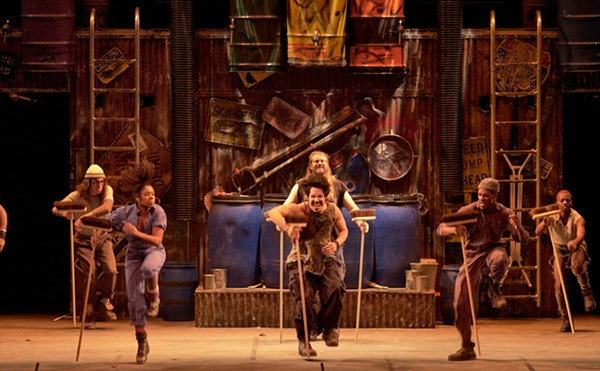In the two one-acts that make up Blue Heart, now being staged by Cesear's Forum, Churchill rips language from its comfortable moorings of polite mutual acceptance (we constantly nod and smile at each other as we talk, as if we know what the hell's going on) and sets it adrift in a choppy ocean of verbal anarchy. Sometimes operating with surgical precision and at other times whacking away like Gallagher sledge-hammering a watermelon, Churchill reduces, distills, and eventually dehydrates language down to its barest essentials, revealing the absurdities that underlie so much of what passes for intelligible interaction. It's a wild, theatrically risky ride that, due to Churchill's skill and a talented cast, is remarkably stimulating -- especially in the first one-act.
The initial piece, "Heart's Desire," presents an English family awaiting the return of its grown daughter from Australia. Mom and Dad and Aunt Maisie briefly discuss the pros and cons of meeting the daughter at the airport, as tensions are quickly revealed. Then they freeze, and the scene begins again. And again. And again. As the layers of repetition accumulate with a little more information added each time, we catch glimpses of events that could develop into an actual plot: A phone call indicates there's been a terrible accident, there's talk of a body buried in the yard, their slacker son stumbles in and demands a confrontation. However, each of these potentially compelling threads is soon lost in the dense fabric of talk, as the same scene is played in double-time or is delivered in clipped shorthand, employing just a word or two from the increasingly familiar sentences. Then, just when you think you can make sense of these instant replays, Churchill pulls out the rug by interjecting a terrorist attack, a screaming run-through by young children, and a visit by one large yellow bird of Sesame Street fame. Thanks to director Greg Cesear, the sprightly pacing of these increasingly bizarre encounters keeps the laughter flowing while allowing a few moments of serious introspection to shine through.
There is less fun in "Blue Kettle," the second work, which focuses on the rather ghastly "hobby" of a 40-year-old man named Derek, who presents himself to a series of elderly women as the child they had put up for adoption years before. His motivation for this cruel prank is never fully revealed, although money is mentioned along with a desperate yearning to connect with his real mother, who is remote and sickly. Again, Churchill puts a trapdoor in this story: The words "blue" and "kettle" begin to pop up in place of other nouns, verbs, and adjectives. At first, it's easy to mentally replace the right word, but soon the blues and kettles start to overwhelm the sentences and, in the process, swamp our shared sense of linguistic stability. This ultimately concludes when Derek and one of his mythical moms are reduced to using vowel sounds and single letters as the components of their language, without ever losing the usual rhythm of normal speech.
By breaking down our intellectual assumptions regarding communication, Churchill is able to question the ways we interact from an entirely new perspective. Each of these plays offers a daunting challenge to actors, and the entire Cesear's Forum company proves more than equal to the task. Jean and Glenn Colerider are captivating as the mom and dad in the first play, repeating their line readings with eerie accuracy as they plumb the bottomless depths of their absurd situation. Lee Mackey is equally adept as Maisie, continually commenting on how hard it is to wait for things to happen, even as things happen all around her. Or do they? Amid the verbal chaos, her reflection on her night terrors when she confronts the reality of death is quite affecting. In "Blue Kettle," Victor D'Altorio masters "blue-kettlespeak" as he ingratiates himself with one helpless woman after another.
One of the philosophical queries in these interlocking plays is intriguing: If words can mean anything, then, perforce, do words mean nothing? Oh well, we've still got our thumbs.













